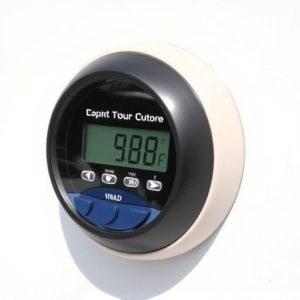Securing Inground Pools: The Role of Swimming Pool Alarms
Swimming pool alarms for inground pools are essential safety devices that provide immediate protect…….
Swimming pool alarms for inground pools are essential safety devices that provide immediate protection against unauthorized access and drowning incidents by monitoring motion and emitting a loud audible alert. These systems play a critical role in enhancing overall pool safety, particularly in homes with multiple residents or frequent guests, as they complement physical barriers like fences and locks. They offer swift response capabilities for timely intervention, which is crucial for potentially life-saving actions. When selecting an alarm, it's important to consider models that are highly audible and responsive to ensure they detect movements effectively, adhere to safety standards, and remain operational. Regular maintenance, including battery checks, sensor cleaning, and obstruction removal, is necessary to keep the alarms functioning correctly. By maintaining swimming pool alarms for inground pools properly, homeowners can significantly reduce the risk of accidents and incidents, contributing to a safer environment for all users.
When it comes to safeguarding your inground pool, investing in a robust swimming pool alarm system is key. This article delves into the critical role these alarms play in maintaining safety and security around your pool area. We’ll explore various types of swimming pool alarms designed specifically for inground pools, providing valuable insights on their installation and maintenance to ensure a protected environment. Stay informed on how to enhance your pool’s safety measures effectively with our detailed guidance.
Understanding the Importance of Swimming Pool Alarms for Inground Pools
Swimming pool alarms for inground pools serve as a critical safety measure to safeguard against unauthorized access and potential drowning incidents. These advanced alarm systems are designed to detect motion in and around the pool area, triggering an audible alert that alerts homeowners or lifeguards instantly to an intrusion or a fall into the water. The promptness of these alarms can be pivotal in preventing accidents, as they provide immediate notification, allowing for swift intervention before a situation escalates.
Furthermore, inground pool alarms are engineered to complement the physical barriers like fences and locks that form the first line of defense. They are particularly beneficial in multi-family residences or properties with frequent visitors, where the likelihood of accidental or intentional unsupervised access is higher. The integration of these alarms into a comprehensive pool safety strategy can significantly reduce the risks associated with swimming pool use, ensuring peace of mind for pool owners and users alike. Regular maintenance and testing of these systems are essential to guarantee their functionality and reliability at all times.
Types of Swimming Pool Alarms and Their Suitability for Inground Pools
Swimming pool alarms are critical components in ensuring the safety and security of inground pools. These systems serve as a deterrent against unauthorized access and can provide vital seconds in the event of an emergency, potentially saving lives through immediate alert notifications. There are several types of swimming pool alarms designed specifically for inground pools, each with its own strengths and suitability for different pool setups. Passive infrared sensors, for instance, detect movement within their range and can be installed at the pool’s entrance or around the perimeter. They are particularly effective in high-traffic areas where frequent, authorized use is common. Acoustic alarms, on the other hand, are triggered by the sound of a fall into the water, making them an excellent choice for pools with heavy foliage or structures that might obscure visual line of sight. Magnetic safety covers, when equipped with an alarm system, offer an additional layer of protection as they can detect when the cover has been disturbed, indicating potential unauthorized access. Homeowners with inground pools should consider these alarms, not only for their ability to integrate with existing home security systems but also for their role in meeting local safety regulations and standards. When selecting a swimming pool alarm for an inground pool, it’s important to assess the pool’s specific environment, usage patterns, and any local legal requirements to ensure the chosen system provides optimal protection.
Installing and Maintaining Your Swimming Pool Alarm System Safely and Effectively
Swimming pool alarms are a critical component in ensuring the safety of your inground pool. When installing such a system, it’s imperative to select an alarm that is both audible and responsive to unauthorized access. These alarms should be capable of detecting any movements around or in the water, alerting you promptly to potential dangers. It’s advisable to choose alarms that conform to established safety standards, ensuring they are reliable and effective in protecting swimmers.
Once installed, regular maintenance and testing are essential to guarantee the alarm system’s functionality. Regularly check the battery levels and replace them as needed to avoid unexpected silences during critical moments. Additionally, test the alarm frequently to ensure it operates correctly. Maintenance also involves clearing any debris from sensors and ensuring that the system is free from obstructions that could impede its sensitivity. By maintaining your swimming pool alarms for inground pools in top condition, you can significantly reduce the risk of accidents and enhance the overall safety of your pool environment.


